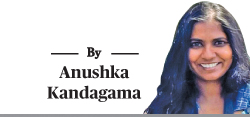 This year, Sri Lankans are celebrating 77 years of Independence. It marks the first Independence Day celebration since the 2022 mass protest movement, which redefined citizen participation in democracy and, in doing so, also expanded the meaning of independence and citizenship — shifting it beyond flag-waving and extravagant ceremonies to a more people-focused vision. In this redefined notion of independence, how are women positioned? Are they truly included in thisexpanded vision of freedom?
This year, Sri Lankans are celebrating 77 years of Independence. It marks the first Independence Day celebration since the 2022 mass protest movement, which redefined citizen participation in democracy and, in doing so, also expanded the meaning of independence and citizenship — shifting it beyond flag-waving and extravagant ceremonies to a more people-focused vision. In this redefined notion of independence, how are women positioned? Are they truly included in thisexpanded vision of freedom?
Among the numerous images and symbols linked to the 2022 mass protest movement, one of the most powerful was that of a mother protesting, holding a child in one hand and a lit candle in the other. Led by this image of a courageous woman, hundreds of thousands of women participated in the protest movement.
The opposing factions advanced various counter-narratives against the movement, often attacking women by sexualising them. These attacks frequently included phrases such as, ‘these women are promiscuous’, and ‘no one will want to marry them’. Despite these verbal assaults, women’s participation in the protest — a site for exercising the democratic powers of citizens — continued to grow.
Herstory in Sri Lankan politics
As Sri Lankan women, we take great pride in our country being the birthplace of the world’s first female Prime Minister, Sirimavo Bandaranaike, and the first female executive president, Chandrika Bandaranaike Kumaratunge. These milestones reflect the progress women in Sri Lanka have made in political leadership. However, this journey began much earlier, in 1927, when Agnes De Silva and members of other women’s groups presented their case to the Donoughmore Commission, advocating for women’s suffrage. Their efforts were successful, leading to voting rights for women over 30 —a crucial step toward political empowerment.
Women in Parliament
The recent presidential and parliamentary elections, the first since the protest movement, brought significant improvements to the country’s democratic spaces, such as a reduction in the influence of ethno-religious identities and a notable increase in women’s representation in parliament, reaching an all-time high. The election of 19 women to parliament is a triumph for the country and the Government. However, it is disappointing that, despite women being elected from all ethnic backgrounds, the government appointed only two women to ministerial positions.
Whether or not women are appointed to ministerial positions, we, as a people, can take pride in the fact that so many women were elected to parliament. However, despite being representatives of the people and holding some of the highest positions in the country’s decision-making processes, they are often attacked — not for what they say or the political ideologies they hold, but simply for being women. They are frequently sexualised and often become targets of the opposition in some of the most vulgar ways imaginable.
Glass ceiling cracked, but it’s still holding on
Women have undoubtedly shattered the glass ceiling, rising to heights they were once excluded from. With the growing number of women involved in protests and their increasing political representation in parliament, women are actively expanding the boundaries of participatory democracy.
However, while these changes are happening on the ground, many women are still struggling to achieve their full potential. The barriers they encounter are not only institutional but also deeply ingrained socio-cultural values that continue to hinder their progress. These regressive values limit women from fully engaging with and benefiting from expanding democratic spaces.
Women at the helm of the new dawn of Independence
The 77th independence marked a political revolution, with the masses asserting their democratic power and broadening the scope of citizenship. Much of the conversation now centers on the role of women in this new era of citizen-independence. While women are fully capable of contributing to the nation’s development, outdated social and cultural values that still hold sway, limiting their potential must be challenged. Women are eager to play a part in advancing the people’s independence, but they cannot do so unless society and more importantly the government is equally committed to progress. If a woman is denied the freedom to express her thoughts openly, dress as she pleases, or walk through public spaces with confidence, it is an injustice for society to impose expectations on her to fulfil any prescribed duties. In this sense, women’s freedom is not only a fundamental right but a collective social responsibility—achieving it would ultimately enrich society as a whole.








